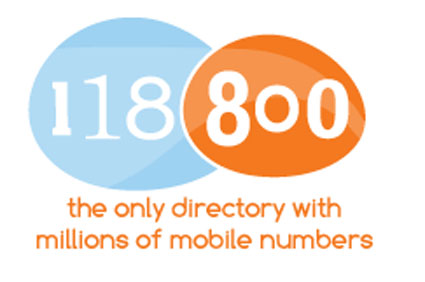
Connectivity, the company behind the launch of online directory 118 800, told the BBC this morning that it had received a thumbs-up from the Information Commissioners Office ahead of its launch next week, and that consumers could withdraw their number from the directory if they wished.
The ICO confirmed this, stating that the service complied with the Data Protection Act (DPA) and Privacy and Electronic Communications Regulations (PECR) because people are connected only when the recipient agrees to take the call following a text message, and without divulging their number.
But the launch of the service has provoked a media backlash, with articles in the and the focusing on the likely privacy fears of those on the 118 800 database.
Connectivity says it compiled the 15m numbers using list brokers and data vendors, mobile lists sold by online businesses collecting opted-in phone numbers, as well as market research firms.
The ICO said that Connectivity had sought its advice prior to launch. "We made it absolutely clear to Connectivity that they should not use numbers where there was any doubt about whether the consumer was happy for their information to be used in this way.
"Connectivity is aware that the law requires them to remove any numbers relating to consumers who request that their information is removed from the directory service. Opting out of the service should be made as easy as possible for anyone who does not want their details to be used for the directory service."
The company has not specified whether any DM high-volume data vendors are involved in supplying mobile data to 118 800. Acxiom and DLG could not be contacted as this story went to press and a spokesperson from Experian said he believed it was not involved.
The big question with any new service like this is the legality of the source data, said Caroline Kimber, head of data planning at agency Stephens Francis Whitson. 118 800 claim that all data is opted in and I would have expected them to have trawled through all the opt in statements of the source data in detail to determine whether or not the data could be used.
Assuming that the opt-in statements are suitably acceptable, I think the additional processes they have set up seem very sound – opting out appears easy and the double verification of checking with the searched person is good.
The process appears very similar to e mail appending. The same concerns were raised when email appending services were launched, but they have proved unfounded.
As long as the data has been sourced responsibly and legally, then this looks like a good service for both consumers and the DM industry."
The service will cost £1 for anyone searching for a number by typing the name and location of the person into the 118800 website.
Nigel Evans MP, the Conservative chairman of the All Party Group on ID Fraud, told the Daily Mail that the emergence of the new service as 'shocking' and 'depressing'.
People feel that their mobile phone number is very private to them and should not be traded for profit…[they] will be infuriated if they find they are bombarded with calls from people they don't want or expect to hear from. It is a clear invasion of privacy.
Tony Coad, business development director at data seller PDV, questioned whether the service’s matching technology would deliver correct mobile numbers, if postcode were missing.
He also believed businesses are not likely to use the directory because of the text prior to a consumer accepting a call. Consumers may use it but I doubt businesses will, because consumers won’t respond voluntarily to commercial messages from Joe Bloggs Double Glazing, he said.


_1.jpg)
.jpg)

